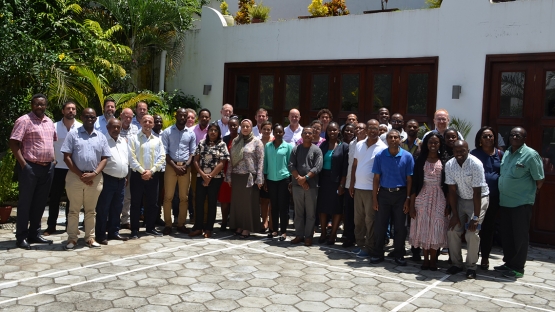Are all areas of the globe affected equally by ocean acidification? What are its socio-economic consequences? While our general understanding of the impacts of ocean acidification is increasing, information in some areas of the world remains scarce. To help address this gap, the IAEA Ocean Acidification International Coordination Centre (OA-ICC) supported the Indian Ocean Regional Ocean Acidification workshop held in Zanzibar, Tanzania 28-29 October 2019. The gathering was a step towards increasing awareness about the issue locally and assessing what resources are available to address it.
Ocean acidification is the ongoing increase of ocean acidity as a result of an uptake of carbon dioxide from the atmosphere. This process impacts marine organisms and ecosystems, and the OA-ICC is coordinating research on these changes.
In Eastern African countries such as Kenya, Tanzania and Mozambique, and islands including Mauritius and the Seychelles, the ocean is an important part of people’s lives and a key source of household income. Yet there is little information about how ocean acidification will impact countries in this region and in Africa as a whole. In order to observe and monitor changes and assess the impact on local industries such as fisheries, aquaculture, or even tourism, local scientists need skills and knowhow.
“We need to build regional capacity to research and observe the changes,” stressed Julius Francis of the Western Indian Ocean Marine Science Association (WIOMSA). “The challenge is not only about funding, but mobilizing regional capacity to actively research the impacts of ocean acidification.”
At the workshop, participants reviewed available resources including funds and infrastructure, local capacity and key priorities for future research. About 40 regional scientists and stakeholders participated as well as international ocean acidification experts, who provided an overview of current scientific knowledge on the topic. One of the main outputs was a draft Action Plan for the region, which will be presented through the Conference of the Parties to the Nairobi Convention for the Protection, Management and Development of the Marine and Coastal Environment of the Western Indian Ocean.
Ocean acidification is not happening in isolation. An Intergovernmental Panel on Climate Change (IPCC) report released in September highlighted the combined effects of greenhouse gas emissions on the ocean, including ocean warming, acidification, oxygen loss and sea level rise. The report states that continued carbon uptake by the ocean by 2100 is “virtually certain” to exacerbate ocean acidification.
Yet, although the ocean is impacted by climate change and ocean acidification, it can also play a key role in regulating climate change and supporting climate action, as reviewed in the Oceans Solutions Initiative, an effort supported by the IAEA OA-ICC and partners. Ocean-based measures such as marine renewable energy can contribute to mitigating climate change. The ocean can also help sequester and store carbon through the protection and restoration of marine ecosystems, especially “blue carbon” ecosystems like mangroves, salt marshes and seagrass beds.
The Ocean Acidification (OA)-Africa network, set up with support from the Global Ocean Acidification Observation Network and the IAEA OA-ICC, works to improve the management of ocean acidification in the Western Indian Ocean and help advance research on the impacts on key socio-economic species in Africa, information needed by resource managers and policymakers to take concrete action to mitigate and adapt to future acidification conditions.
David Osborn, Director of the IAEA Environment Laboratories which host the OA-ICC, emphasized that “we must accelerate the science, while also building the bridge to policy. It’s important now to look at not only what ‘has’ been done, but what ‘should’ be done in the immediate and longer term.” David Osborn co-chairs the UN Community of Ocean Action on ocean acidification which brings together global stakeholders from different disciplines and backgrounds to find ways to work together to accelerate progress and bridge between disciplines.
The workshop was organized by the Ocean Acidification international Reference User Group (OAiRUG), chaired by the International Union for Conservation of Nature, and the Western Indian Ocean Marine Science Association (WIOMSA) in collaboration with the IAEA, the Prince Albert II of Monaco Foundation, and the UN Environment Nairobi Convention.






